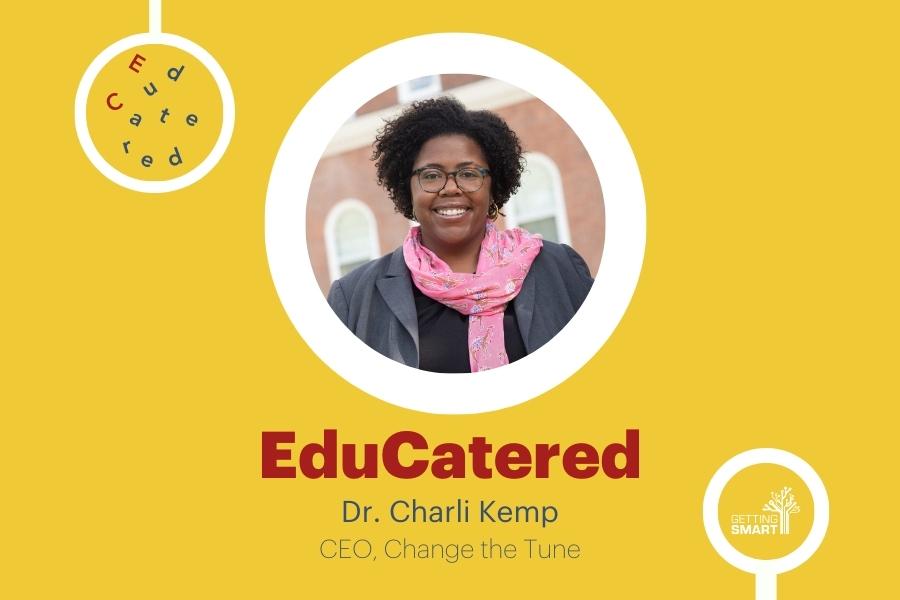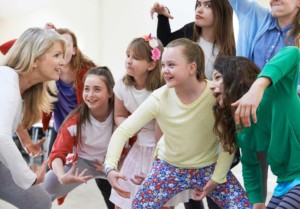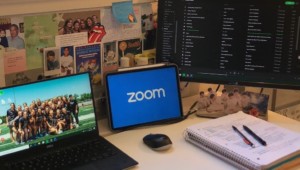(BONUS) EduCatered: Dr. Charli Kemp
Key Points
-
If kids are joyful and having fun, they’re creating memories.
-
Kids can have agency within their families.

Thank you to BetterHelp for sponsoring this episode. Speak with an affordable, licensed therapist at your convenience and save 10% on your first month at BetterHelp.com/GettingSmart.
Hey, we’re still in between seasons over here on EduCatered – but we were missing you, so we decided to put out a bonus episode with Dr. Charli Kemp, a transformative leader, thinker and doer in the education space. Dr. Kemp is a former middle school teacher turned Harvard PhD and CEO of Change the Tune.
When not rocking Change the Tune, Dr. Charli Kemp is probably listening to one of her over 900(!!!) playlists on Spotify.
We need to go where the kids are, where the communities are if we want to make an impact.
Dr. Charli Kemp
Shawnee Caruthers: Hey, it’s me, Shawnee. On today’s episode of EduCatered, I am joined by Dr. Charli Kemp, a transformative leader, thinker, and doer in the education space. Dr. Kemp is a former middle school teacher turned Harvard Ph.D. and CEO of Change the Tune. When not rocking Change the Tune, Dr. Charli Kemp has over 900 playlists on Spotify. Charli, what would a music playlist look like in… what kind of vibe are we going for?
Charli Kemp: Well, I just got back from Ghana, and I have an Afro-situation playlist, so I can share it with you later.
Shawnee Caruthers: Okay, yeah, we’ll definitely make sure that we link that. But I’m not going to let it just fly by that you just got back from Ghana! Give us a key learning from Ghana and how that relates to what you’ve been thinking about in the education space.
Charli Kemp: Sure. I think one of the most powerful things—I went for a wedding of one of my mentors, a good friend. Because I went and knew someone there, I got to spend some time with her family. On Christmas Day, we went to the beach, and there were a couple of other days where they had family meetings, literally discussing responsibilities across the older and younger generations, and how to hand them off. In the States, at least in my family, I’ve never seen formal family meetings. There’s a concept—I think it’s considered a South African, not Ghanaian, principle, but it’s part of African culture more broadly—called “Ubuntu,” meaning “I am because we are.” When I think about what we want to teach our kids, it’s this idea of interdependence. One of the things we focus on with Change the Tune is the Sustainable Development Goals, which highlight how life isn’t just about us; it’s about our collective family, not just our immediate families. Seeing this happen on a micro level within families was powerful. It reinforced for me that kids can be agents in their family. How do we teach them to have conversations, bring different ideas to the table, and participate in decision-making? The family meeting as a collective was a big learning experience for me.
Shawnee Caruthers: Is there a way that you’re now pondering how to bring that concept into school systems, or are you still sitting with it?
Charli Kemp: No, I am definitely pondering it. We primarily target underserved communities, but I don’t think this is exclusive to underserved communities. I think, in general, we’re not really taught how to work with each other. Have you ever done a group project and thought, “These people don’t know how to collaborate?”
Shawnee Caruthers: Definitely!
Charli Kemp: Exactly. Across my schooling experience, there was never any explicit instruction about things like hearing everyone before making a decision, merging ideas, or deciding what’s best for the group. I’ve thought about this even before going to Ghana, but seeing it in action within families inspired me more. In our summer programs, kids work in groups to create Social Justice Business Plans. They explore the Sustainable Development Goals and design projects together. To me, if we teach kids how to collaborate effectively, understanding that “If you want to go fast, go alone. If you want to go far, go together,” it can transform how they operate. Real change requires working together, which is challenging because of different perspectives. So, a core focus of Change the Tune is to break out of silos and go far together.
Shawnee Caruthers: We’ll definitely dig into Change the Tune, but I want to switch things up and ask you a question we ask all our guests: If you were to contribute a recipe to a cookbook, what would it be and why?
Charli Kemp: Well, first off, I’m a Libra, so my mind goes everywhere! This recipe might change tomorrow, but for today, I’ll say smoothies. One of the things we do at Change the Tune with our kids is cooking, so we have a lot of recipes. But smoothies are a favorite—they’re easy, and I make a pretty darn good one. There would also have to be a playlist that goes with it, of course!
For the smoothie, the critical ingredients are berries, definitely. I like to add kale—you don’t even taste it, but you get the roughage. Almond butter, chia seeds, Ripple pea protein milk for the protein, a little agave, and more berries. Sometimes we throw in mango. Really, it depends on the day, but a berry base with almond butter and ice is my go-to. And you have to drink it with a nice recyclable metal straw—it’s a whole vibe. Then we cue the playlist, maybe some Tim’s “Vibe Out” or “God Morning” for a positive start to the day. It’s all about creating a good mood with a good smoothie.
Shawnee Caruthers: What’s the playlist that goes along with the smoothie?
Charli Kemp: We’d start with Tim’s “Vibe Out.” There’s also a new song called “God Morning,” with a chorus that goes, “I’m gonna show up for myself.” That would definitely be on there. I’d also add Montell Jordan’s “This Is How We Do It,” so people know, “This is how we make smoothies!” And then a bit of Toby Nwigwe’s remix of “Wake Up Everybody” for that uplifting, get-up-and-go feel. It would be a positive, good-morning playlist to enjoy with the smoothie.
Shawnee Caruthers: A good blend with the smoothie and a good blend with the music. Starting the day with a lot of joy—do you make joy a practice? If so, what’s your joy practice?
Charli Kemp: Absolutely. You mentioned I have over 900 playlists—music is my joy practice. My company is called Change the Tune, and while we do some music programming, it’s not just about music. Music is everything. It’s math, which I connected to when I was a math teacher. It’s joy—when you hear that song you love, when the beat drops, you’re ready to dance or take on a chore. For me, music is transformative joy.
If it’s not joyful, I don’t want it. As a middle school math teacher for five years, I realized that if something wasn’t fun, kids wouldn’t remember it. I’ve come up with a formula: if kids are joyful and having fun, they’re creating memories, and if they’re creating memories, they’re learning. Learning is essentially building memory. So, if we ground ourselves in joy and reflect on the process, that’s where transformation happens. For me, music makes that happen. And whenever I can, I try to be on a beach. I spent a lot of time in Jamaica, and this summer, we even added swimming to our camp. Sun and water are also part of my joy practice.
Shawnee Caruthers: Do you think music is the great unifier? Sometimes people think only diverse communities need it, but why is music such a great tool for all students?
Charli Kemp: Music truly is the great unifier. You mentioned Gracie’s Corner, which my nephew, who’s about to turn one, loves. He dances along, even though he doesn’t know his ABCs yet. His sister, who’s five, can already read, partly because her mom teaches her a lot through songs. Music has frequencies that resonate with our brains and help us relax, which is essential for learning. When kids are relaxed, they learn better.
Music also creates memories. If you’ve ever been to a concert—Afrochella or Coachella—you see people from all backgrounds singing together. Music transcends race, gender, and other differences. It’s powerful for learning because it helps students remember concepts. For example, when I taught fractions, I used Stevie Wonder’s “These Three Words” to teach “Keep, Change, Flip.” Kids remembered it, and it brought the classroom together by connecting home and school through music.
Shawnee Caruthers: Is that what you’re trying to do with Change the Tune? Tell me more about how it all connects.
Charli Kemp: Sure. There are two main aspects to Change the Tune. First, I’ll share a bit more about myself, then I’ll explain the data behind our mission. I was born and raised in LA, attending a mix of private, public, and magnet schools. I grew up in a single-parent household, went to Spelman College in Atlanta, and then joined Teach for America in New York City, teaching three years in the South Bronx and two in East Harlem. Those experiences highlighted what’s broken in the education system but also what works at the micro level with youth.
I realized early on that I wanted to do after-school work. During my teaching, I’d run school stores, teaching kids about revenue, cost, and profit. I eventually went to business school and came up with the concept of Change the Tune there. Business school can make you risk-averse, so I worked with Green Dot Public Schools in finance and operations for a while. I also started their social-emotional learning program, creating a framework for around 10,000 students. This was where I got to pilot Change the Tune, hosting a summer camp where 40 Black and Brown girls created social justice business plans, did art, music, and all sorts of activities.
When I returned to Green Dot, I wanted to keep doing that kind of programming, but they had other plans for me. I’m not someone who can stick to someone else’s plan, so I officially launched Change the Tune as an after-school program. I realized that school systems often replicate broken models. Charter schools say they’re different, but they operate under the same constraints as public schools. That led me to pursue a doctorate at Harvard, where I studied systems-level leadership and explored ways not to replicate these systemic issues.
The data behind Change the Tune is important. Kids spend 80% of their waking hours outside of school. Wealthier families spend nine times more on outside-of-school activities than lower-income families, resulting in about 6,000 more hours of learning for upper-income children by sixth grade. People often say, “We need better schools,” but even perfect schools wouldn’t close that gap if they only operated from 8 a.m. to 3 p.m. September to June. That’s why Change the Tune focuses on reimagining learning beyond traditional school hours, including after-school, summer and even rethinking what the school day looks like. Our goal is to create powerful after-school and summer programs that reimagine learning as an experience where kids can become leaders, discover who they want to be, and develop the skills to create solutions for the challenges of our future world
Shawnee Caruthers: So talk to me about your impact. What impact have you seen as a result of your work so far?
Charli Kemp: Sure. To date, we’ve served more than 700 kids and have run programs in the Bahamas, Los Angeles, Chicago, and some pilot work in Somerville, Massachusetts. We’ve also worked with refugees in Kenya, Malawi, Rwanda, and South Africa. On the fundraising side, we’ve raised nearly $600,000 over the past five years, but we’re working to raise more to scale our impact.
Let me share a few stories. One powerful story comes from our very first summer camp. We do mindfulness and yoga with our youth because if we’re not okay, we can’t learn. During the pandemic, one of our youth reached out to our yoga teacher and said, “Thank you for what we did during summer camp two years ago. Because of you, I know how to breathe, ground myself, and use mindfulness, so I’m doing okay during this pandemic.” That one comment showed us the lasting impact of these skills.
During the pandemic, we didn’t shut down; we actually created virtual summer camps. When we asked the kids what they could do at the end of camp that they couldn’t do four weeks ago, they said things like “talk to each other,” “think bigger,” and “breathe and take mindfulness moments.” It was powerful to see them develop these coping skills and mechanisms for self-care.
Recently, one of our kids really took to gardening. He convinced his mom to build a garden at home, then started bartering with her around his chores to get to go to Home Depot. He even told his pastor about the garden, which inspired the church to start a community garden. This is the ripple effect of Change the Tune—kids are becoming leaders in their households and communities, inspiring others to think differently and make positive changes.
Shawnee Caruthers: How can communities bond together to encourage youth leadership? In some Black and Brown neighborhoods, communities might feel distant or even hostile toward their youth, possibly because of issues like violence. What can communities do to embrace youth and build leadership skills?
Charli Kemp: That’s a great question. When I started Change the Tune, I partnered with a local café, Hot and Cool Café in Los Angeles. They gave us free space and snacks, but we didn’t get a lot of kids coming from the local school, which was just a seven-minute walk away. I realized I needed to go where the kids were, so I went to the school with a proposal. They were supportive, but I had to meet the kids where they were.
For communities, I’d say we need to go to where the kids are if we want to make an impact. There are so many artists, musicians, chefs, and yoga teachers who could offer an hour of their time to kids. Schools may have barriers like fingerprinting and background checks, but once you get through that, which might take two weeks, you can start volunteering. Persistence is key.
For schools, I’d say look beyond the idea that teachers have to do everything. Teachers can’t teach everything; we need artists, musicians, and chefs. Local chefs could come in and show kids how to cook. Schools shouldn’t see themselves as insular organizations with rigid curricula. Kids need exposure to the wider world.
Also, grounding our efforts in community goals, like the Sustainable Development Goals, can help. Many of our kids create projects to address homelessness or other local issues because they care deeply about these things. Imagine a world where school curricula were built around solving real community challenges in joyful and engaging ways. Where would our world be if that’s how our education system was structured?
Shawnee Caruthers: Speaking of community, who or what are some people in your community that you’re listening to and learning from to inform your work?
Charli Kemp: I’d mention Vanessa and Morgan from GirlTrek. They’re two Black women leading the largest Black women’s health organization in the world, and they have a powerful vision. They’re all about walking, health, and self-care, with programming both in Ghana and Los Angeles. The way they think, care, and unite communities is inspiring. They’re bringing people together in such a thoughtful way, and I admire how they make well-being central to their mission. We started this conversation talking about family, and Vanessa and Morgan understand the power of Black women and families in driving change. Their work with GirlTrek is something I really admire and follow closely.
Shawnee Caruthers: I think I’ve heard their podcast once before—I’ll definitely have to check it out more! Thank you for sharing that. As we wrap up, we’ve talked a lot about Change the Tune, joy, leadership, and the importance of play, rest, reflection, and growth. Do you have a favorite quote or any lasting thoughts about how to lean into those values of play, joy, and growth?
Charli Kemp: There are so many quotes that come to mind. Bell Hooks has many powerful quotes, and Audre Lorde talks about self-care as a radical act. I’m also thinking of Marianne Williamson’s ideas about embracing our own greatness. But ultimately, it comes down to figuring out how you want to make an impact in the world and caring for yourself so you can sustain that impact. That’s the big goal.
Shawnee Caruthers: I appreciate you chatting with me today. And one last question before you go—what’s a song we should all be vibing to today?
Charli Kemp: Ooh, a song we should all be vibing to today? Let me pull up my January playlist real quick… It’s loading slowly!
Shawnee Caruthers: It can be any song.
Charli Kemp: Okay, sure. There’s a song called “Simpa” on my Afro-situation playlist. I don’t even know what it means, but it has a whole vibe. Definitely add “Simpa” to your list!
Shawnee Caruthers: Perfect. Thank you again for chatting with us today and for being an EduCatered guest.
Charli Kemp: Thank you!
Links:








0 Comments
Leave a Comment
Your email address will not be published. All fields are required.